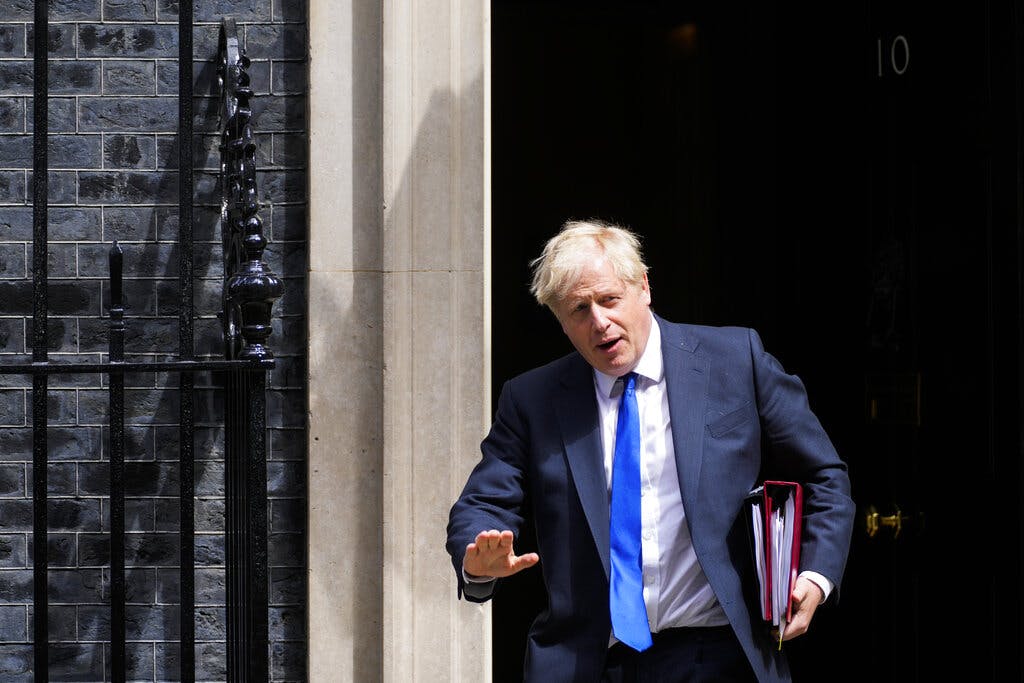This Time, Boris Johnson Stands Firm Against Exit
Johnson is struggling to stay in power after the resignation of two top ministers and a slew of more junior officials, who said they could no longer serve under his scandal-tarred leadership.

LONDON — “Frankly the job of the prime minister in difficult circumstances, when he’s been given a colossal mandate, is to keep going,’’ a defiant Prime Minister Johnson said Wednesday in response to new demands he resign.
Mr. Johnson is struggling to stay in power after the resignation of two top ministers and a slew of more junior officials, who said they could no longer serve under his scandal-tarred leadership.
Mr. Johnson is known for his uncanny ability to wiggle out of tight spots, but a series of accusations of misdeeds have pushed him to the brink, and some of his fellow Conservative lawmakers now worry that the leader renowned for his affability could be a liability in elections.
Many are also are concerned about the ability of a weakened Mr. Johnson, who only narrowly survived a no-confidence vote last month, to govern at a time of increasing economic and social strain.
At the weekly Prime Minister’s Questions session in Parliament on Wednesday, members of the opposition Labour Party shouted “Go! Go!’’
Then, more damningly, members of his own Conservative Party challenged the leader. Lawmaker Tim Loughton was the first to ask whether there was anything that might prompt him to resign.
After Mr. Johnson explained it was his “job’’ to stay in office in light of his “colossal mandate,’’ his fellow Conservatives listened quietly, offering little support.
The grilling was the first of two challenges Wednesday for the leader. He must still get through a long-scheduled interrogation by a committee of senior lawmakers later in the day.
How he handles the tough questions could indicate whether a simmering rebellion in his Conservative Party can gather enough strength to oust him.
Also on the horizon is a vote in a powerful party committee that could signal whether lawmakers have the appetite to push for another no-confidence measure.
Months of discontent over Johnson’s judgment and ethics within the governing Conservative Party erupted with the resignations of the Treasury chief, Rishi Sunak, and the Health Secretary, Sajid Javid, within minutes of each other on Tuesday evening.
The two heavyweights of the Cabinet were responsible for tackling two of the biggest issues facing Britain — the cost-of-living challenge and the ongoing Covid pandemic.
In a scathing letter, Mr. Sunak said “the public rightly expect government to be conducted properly, competently and seriously. … I believe these standards are worth fighting for and that is why I am resigning.”
Mr. Javid said the party needed “humility, grip and a new direction” but “it is clear this situation will not change under your leadership.”
Mindful of the need to shore up confidence, Mr. Johnson quickly replaced the two ministers, promoting Nadhim Zahawi from the education department to treasury chief and installing his chief of staff, Steve Barclay, as health secretary.
But a string of resignations late Tuesday and early Wednesday from more junior ministers — from both the liberal and right-wing branches of the Conservative Party — showed that danger to Mr. Johnson was far from over.
In the past few months, Mr. Johnson has been fined by police and criticized by an investigator’s report for government parties that flouted the Covid restrictions they imposed on others; saw 41 percent of Conservative lawmakers vote to oust him in the no-confidence vote; and watched formerly loyal lieutenants urge him to resign.
Through it all, he has vowed to carry on governing — even suggesting he wanted to stay in office until the 2030s.
But the former international development secretary, Andrew Mitchell, was among several members of the Conservative Party who told Mr. Johnson his time was up.
“It’s a bit like the death of Rasputin. He’s been poisoned, stabbed, he’s been shot, his body’s been dumped in a freezing river and still he lives,’’ he told the BBC.
“But this is an abnormal prime minister, a brilliantly charismatic, very funny, very amusing, big, big character. But I’m afraid he has neither the character nor the temperament to be our prime minister.”
The final straw for Messrs. Sunak and Javid was the prime minister’s shifting explanations about his handling of sexual misconduct allegations against a senior Conservative lawmaker.
Johnson’s opponents in the party hope more Cabinet ministers will follow Sunak and Javid, though for now other top officials — including the Foreign Secretary, Elizabeth Truss, the Defense Secretary, Ben Wallace and the Home Secretary, Priti Patel, — are staying put.
Opponents are also trying to force another no-confidence vote over the prime minister. The existing rules require 12 months between such votes, but the rules are made by a party committee and can be changed. Elections for that committee’s executive are due in the next few weeks.
